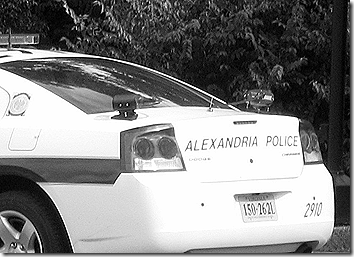
ALPR. Image via Wikipedia
Have you seen cameras like this on police cars near you lately? You will. The technology is called ALPR- Automatic License Plate Recognition, and it's going to be almost everywhere in the US in the near future. ALPR allows the automated scanning of over a hundred plates a minute. That plate information is matched versus databases like NCIC (FBI database) in the US. That database will indicates vehicles reported stolen, criminal warrants, and so on. Local departments can add their own data to check against, including unpaid fines and tickets (scofflaws), and so forth.
There is some controversy is that the plates are scanned without "probable cause," but law enforcement argues that scanning a license is not a search, or arrest, at all, but running a publicly displayed license plate.
 If there is a "hit" with an ALPR camera, the officer may usually make a stop, but must verify the hit before taking action, so, if done properly, there is a low chance that there will be a false arrest, etc. That is, unless the database information itself is wrong. In my experience, it's not that unusual for it to be wrong, but it's a low percentage.
If there is a "hit" with an ALPR camera, the officer may usually make a stop, but must verify the hit before taking action, so, if done properly, there is a low chance that there will be a false arrest, etc. That is, unless the database information itself is wrong. In my experience, it's not that unusual for it to be wrong, but it's a low percentage.For example, a stolen vehicle may be reported, but then the owner realizes that they just parked it at another location, or it was towed, and never calls back to report that it's been recovered. In that case, an officer has cause to pull over the "car thief" and even detain them. Similarly, people may be reported missing and then not removed from the NCIC database and be associated with a particular vehicle.
There are other uses for the data that's collected, however. Departments make use the the tag information which is associated with locations via GPS to place a person at a particular place in time. For example, a known distributor of narcotics may be under surveillance for a while, and patrol cars may not have any cause for a stop, but their ALPR cameras may capture the vehicle location and log it over and over. That may give a circumstantial locations to show that he/she was selling to someone at a particular location.
The privacy advocates may have the biggest issues with that stored location data of almost every car on the road. You may not realize it, but ALPR is in use all over the place. Any choke point on major roads may have it; almost all toll plazas have them, so they know when you enter and leave a toll road, and where; some bridges have them, such as the Chesapeake Bay Bridge in Maryland; all speed and red light cameras utilize this technology, and many municipal parking lots are equipped with them. At this point, the databases are not shared with other agencies, but could easily be, on request, or via court order. Do you have a problem with that?
The main benefit to the public is that the stolen vehicles and wanted persons are pulled over NOW, not when they commit another crime. I am a big believer in the benefits of traffic stops. Many mass-murderers and gangsters have been taken down because of traffic stops, and major drug distributors are stopped every day because of traffic stops.
The other benefit to ALPR technology is Officer Safety, something near and dear to me. Wouldn't you like your officers to know that the vehicle they are stopping has a driver who may be wanted for armed robbery, or has a history of mental illness, or a long criminal record? How much safer will an officer be if he or she knows they need lots of backup, and need it NOW?! Too many officers die on traffic stops because they make so many that they become routine, and the ambusher inside the vehicle always has an advantage.
So, ALPR is here, and it will be even more prevalent in the next 2-5 years as the cost is going down. Keep your vehicle registration up to date, obey traffic laws, and don't rob any banks or stores, and you should be fine with ALPR on the road.

No comments:
Post a Comment